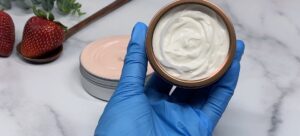Introduction
Stretch marks, often seen as inevitable during periods of rapid growth or skin stretching, are a common concern for many. While they cannot always be entirely prevented, antioxidants play a crucial role in maintaining skin health, enhancing elasticity, and minimizing the risk of stretch marks. In this article, we’ll explore how antioxidants work, the best sources to incorporate into your skincare routine, and why they’re essential for your skin’s resilience.
What Are Antioxidants and How Do They Work?
Antioxidants are compounds that protect the skin from oxidative stress caused by free radicals. Free radicals are unstable molecules generated by environmental factors like UV radiation, pollution, and even stress. When left unchecked, these molecules damage collagen and elastin fibers in the skin, leading to reduced elasticity and a higher likelihood of developing stretch marks.
Key Benefits of Antioxidants for the Skin:
- Protecting Collagen and Elastin: Antioxidants neutralize free radicals, preserving the structural proteins responsible for skin elasticity.
- Enhancing Skin Regeneration: They promote cell turnover, helping the skin repair itself more effectively.
- Reducing Inflammation: Antioxidants soothe the skin and reduce redness, making it more resilient to damage.
- Boosting Hydration: Many antioxidant-rich ingredients also improve the skin’s ability to retain moisture.
Top Antioxidants for Skincare
1. Vitamin C
- Why It’s Effective: Vitamin C is a powerhouse antioxidant that stimulates collagen production and brightens the skin. It helps repair damaged skin and fade stretch marks over time.
- How to Use: Apply a Vitamin C serum daily under sunscreen for maximum protection and repair.
2. Vitamin E
- Why It’s Effective: Known for its moisturizing and healing properties, Vitamin E protects the skin barrier and improves elasticity.
- How to Use: Look for creams or oils containing Vitamin E, and apply them to areas prone to stretch marks, like the abdomen, thighs, and hips.
3. Resveratrol
- Why It’s Effective: Found in grapes and red wine, resveratrol combats oxidative stress and enhances skin firmness.
- How to Use: Incorporate serums or moisturizers with resveratrol into your nighttime routine for repair and renewal.
4. Niacinamide (Vitamin B3)
- Why It’s Effective: Niacinamide improves skin elasticity, strengthens the skin barrier, and reduces redness.
- How to Use: Use niacinamide-containing products, like serums or moisturizers, to enhance overall skin health.
5. Coenzyme Q10 (CoQ10)
- Why It’s Effective: CoQ10 is a naturally occurring antioxidant that supports energy production in skin cells, promoting repair and resilience.
- How to Use: Opt for lotions or serums containing CoQ10 for daily use.
Antioxidants in Natural Skincare Ingredients
You don’t always need fancy products to enjoy the benefits of antioxidants. Many natural ingredients are rich in these compounds and can be used in DIY skincare routines.
Best Natural Antioxidant Sources:
- Green Tea Extract: Contains polyphenols that protect against UV damage and promote skin elasticity.
- Rosehip Oil: Packed with Vitamin C and A, rosehip oil helps fade stretch marks and improves skin texture.
- Aloe Vera: Offers a combination of hydration and antioxidants that soothe and heal the skin.
- Coconut Oil: While primarily a moisturizer, coconut oil contains Vitamin E, which aids in elasticity.
How Antioxidants Help Prevent Stretch Marks
1. Strengthening Skin Elasticity
Antioxidants like Vitamin C and E play a direct role in collagen synthesis, which is crucial for maintaining skin’s elasticity and reducing the risk of stretch marks.
2. Protecting Against Environmental Damage
By shielding the skin from UV radiation and pollution, antioxidants minimize the breakdown of collagen and elastin, which can lead to stretch marks over time.
3. Supporting Skin Regeneration
Antioxidants enhance the skin’s ability to repair itself, making it more resilient during periods of rapid stretching, such as pregnancy or weight changes.
Tips for Incorporating Antioxidants Into Your Routine
Daily Skincare
- Start With a Serum: Antioxidant serums, particularly those containing Vitamin C or niacinamide, should be applied in the morning before sunscreen.
- Use Antioxidant-Rich Moisturizers: These help lock in hydration and provide a protective barrier throughout the day.
- Don’t Skip Sunscreen: UV rays accelerate oxidative stress, so pairing antioxidants with broad-spectrum sunscreen is essential.
Diet Matters Too
Skincare isn’t just about what you put on your skin—it’s also about what you eat. Foods rich in antioxidants can help protect your skin from within.
- Top Foods for Skin Health:
- Berries (blueberries, strawberries)
- Leafy greens (spinach, kale)
- Nuts and seeds (almonds, sunflower seeds)
- Green tea and dark chocolate
FAQs
Can antioxidants completely prevent stretch marks?
While antioxidants improve skin elasticity and resilience, they cannot guarantee prevention. Genetics and the extent of skin stretching also play a role.
How soon can you see results from antioxidant skincare?
Visible improvements in skin texture and elasticity may take 4–8 weeks of consistent use.
Are antioxidant products safe during pregnancy?
Most antioxidant products, like those with Vitamin C or E, are safe during pregnancy. However, consult with a healthcare provider to ensure safety.
Conclusion
Antioxidants are an essential component of any skincare routine, offering powerful protection against the damage that leads to reduced skin elasticity and stretch marks. Whether through topical creams, serums, or natural oils, incorporating antioxidants into your daily regimen can help your skin stay firm, hydrated, and resilient. Pairing these with a balanced diet rich in antioxidant-packed foods will further enhance your results. Take care of your skin today, and enjoy the long-lasting benefits of improved elasticity and health.




